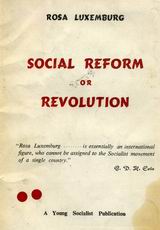

|
|

Social Reform or Revolution
Luxemburg, Rosa
http://www.connexions.org/CxLibrary/Docs/CX6564-LuxemburgReformRevolution-00index.htmhttp://www.marxists.org/archive/luxemburg/1900/reform-revolution/index.htm Year First Published: 1900 Year Published: 1908 Pages: 64pp Dewey: 320.5315 Resource Type: Book Cx Number: CX6564 Rosa Luxemburg's attack on reformism. Abstract: - Excerpt: It is contrary to history to represent work for reforms as a long-drawn out revolution and revolution as a condensed series of reforms. A social transformation and a legislative reform do not differ according to their duration but according to their content. The secret of historic change through the utilisation of political power resides precisely in the transformation of simple quantitative modification into a new quality, or to speak more concretely, in the passage of an historic period from one given form of society to another. That is why people who pronounce themselves in favour of the method of legislative reform in place and in contradistinction to the conquest of political power and social revolution, do not really choose a more tranquil, calmer and slower road to the same goal, but a different goal. Instead of taking a stand for the establishment of a new society they take a stand for surface modifications of the old society. If we follow the political conceptions of revisionism, we arrive at the same conclusion that is reached when we follow the economic theories of revisionism. Our program becomes not the realisation of socialism, but the reform of capitalism; not the suppression of the wage labour system but the diminution of exploitation, that is, the suppression of the abuses of capitalism instead of suppression of capitalism itself. Does the reciprocal role of legislative reform and revolution apply only to the class struggle of the past? It is possible that now, as a result of the development of the bourgeois juridical system, the function of moving society from one historic phase to another belongs to legislative reform and that the conquest of State power by the proletariat has really become "an empty phrase," as Bernstein puts it? The very opposite is true. What distinguishes bourgeois society from other class societies - from ancient society and from the social order of the Middle Ages? Precisely the fact that class domination does not rest on 'acquired rights' but on real economic relations - the fact that wage labour is not a juridical relation, but purely an economic relation. In our juridical system there is not a single legal formula for the class domination of today. The few remaining traces of such formulae of class domination are (as that concerning servants), survivals of feudal society. Table of Contents: Introduction The Opportunist Method The Adaptation of Capitalism The Realisation of Socialism through Social Reforms Capitalism and the State The Consequences of Social Reformism and General Nature of Reformism Economic Development and Socialism Co-operatives, Unions, Democracy Conquest of Political Power Collapse Opportunism in Theory and Practice Subject Headings |